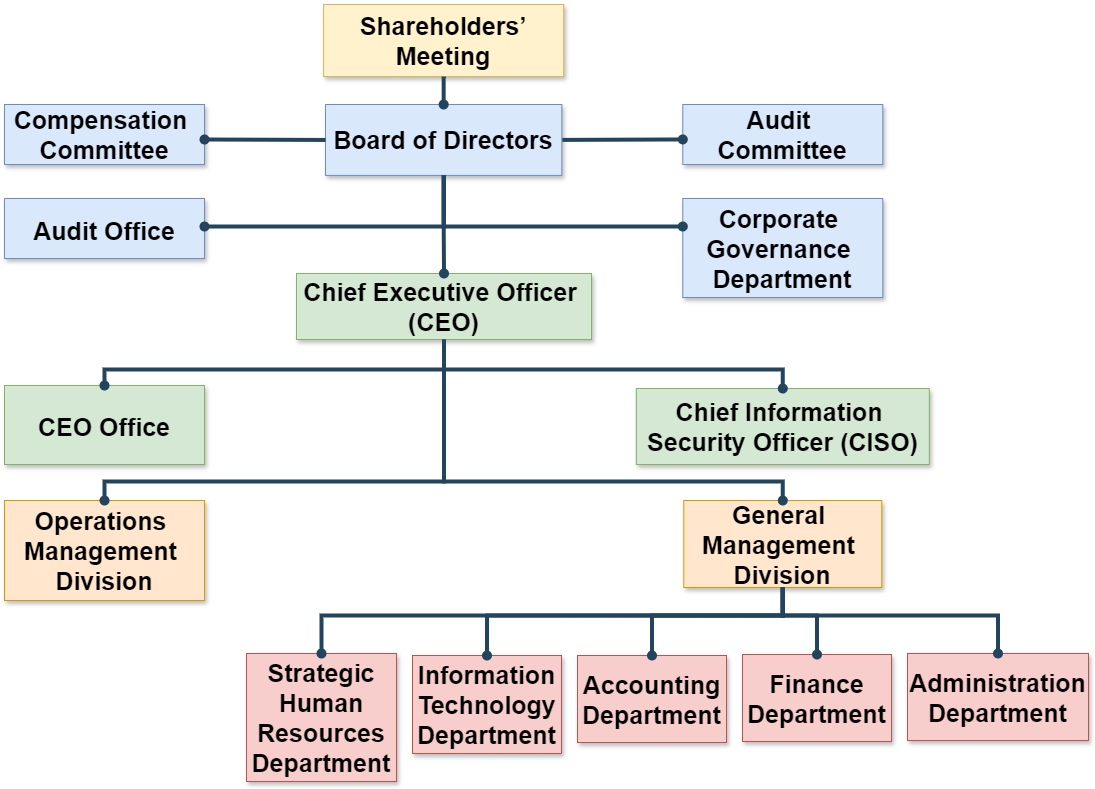HOME
Corporate Governance
Corporate Governance
Corporate Governance
- Corporate Governance
- Board of Directors
- Significant Board Resolutions
- Director Training and Development
- Communication between Independent Directors, Internal Audit Supervisor, and Auditors
- Audit Committee
- Remuneration Committee
- Internal Audit
- Core Internal Regulations
- Stakeholders
- ESG Sustainability Management
- Cybersecurity Risk Management
- Shareholders’ Meeting
- Dividend Policy
- Market Observation Post System (MOPS)
Corporate Governance
Purpose
Principles
Internal Control System
The company adheres to internal control standards for publicly listed companies to ensure operational effectiveness and transparency. The internal control system is regularly reviewed and revised to adapt to changes in the company’s environment.
System Establishment and Revision: Jointly determined by the Audit Committee and the Board of Directors.
Responsible Personnel
- To establish an effective corporate governance structure that protects shareholders' interests, enhances company value, and ensures long-term, sustainable operations.
Principles
- Protecting Shareholders' Rights: Placing shareholders' interests at the core of corporate governance.
Strengthening the Board’s Functions: Ensuring the effective operation of the Board of Directors as the cornerstone of sound decision-making and corporate management. - Leveraging Independent Directors: Independent directors provide objective, professional advice to ensure diversity and fairness in corporate decision-making.
- Respecting Stakeholders' Rights: Maintaining close communication and collaboration with stakeholders to safeguard their rights and interests.
- Enhancing Information Transparency: Providing accurate, timely, and publicly accessible information to ensure investors and stakeholders have a clear understanding of the company's operations.
Internal Control System
The company adheres to internal control standards for publicly listed companies to ensure operational effectiveness and transparency. The internal control system is regularly reviewed and revised to adapt to changes in the company’s environment.
System Establishment and Revision: Jointly determined by the Audit Committee and the Board of Directors.
- Self-Assessment and Audit: Each department conducts self-assessments and regularly reviews audit reports.
- Management Support: The management values the internal audit function, ensuring its effective implementation.
- Audit Personnel Management: The appointment, evaluation, and remuneration of audit personnel are approved by the Chairman based on the recommendation of the Chief Audit Officer.
Responsible Personnel
- The company places great importance on corporate governance and ensures the appointment of qualified personnel to handle related matters. Specific arrangements are as follows:
- Responsible Unit: The Finance and Accounting Department handles corporate governance affairs, including organizing and managing the Board of Directors and Shareholders’ Meetings, as well as ensuring compliance with relevant laws and regulations.
- Supervisor: A designated senior executive is responsible for overseeing corporate governance matters.
- Qualification Requirements: The appointed senior executive should possess a relevant professional background and experience.
Corporate Governance Structure

Departmental Responsibilities
| Department | Main Responsibilities |
| Board of Directors | Executes resolutions from the Shareholders’ Meeting and determines the company’s business plans and investment proposals within the authorized scope. |
| Compensation Committee | Formulates and periodically reviews policies, systems, standards, and structures related to the performance evaluation and remuneration of directors and executives. It also evaluates and proposes the content and amounts of directors’ and executives’ remuneration for the Board’s approval. |
| Audit Committee | Supervises the group’s business and financial matters, ensuring the fair presentation of financial statements and the effective implementation of internal controls. |
| Corporate Governance Officer | Handles matters related to Board and Shareholders’ Meetings, prepares meeting minutes, assists directors and supervisors with onboarding and ongoing training, provides necessary information for directors and supervisors to perform their duties, and ensures compliance with regulations. |
| Audit Office | Conducts internal audits and evaluates the company’s internal controls, providing improvement suggestions and tracking the progress of corrective actions. |
| CEO Office | Develops the company’s vision, goals, and strategies; integrates management systems and company regulations; analyzes investment value and feasibility of new ventures; promotes corporate culture and management philosophy; and facilitates vertical and horizontal integration of departmental operations. |
| Information Security Officer | Responsible for the group’s information security, including formulating security strategies, assessing and managing risks, and responding to security incidents. |
| Operations Management Division | Leads business units in setting operational goals and strategies, supervises planning and execution to achieve corporate objectives, and implements major company policies. |
| General Management Division | Leads the group’s finance, accounting, tax, HR, and IT functions, formulates and executes relevant strategies, provides analysis and management to support the group’s operational development, and manages the appointment and evaluation of business unit leaders. |

